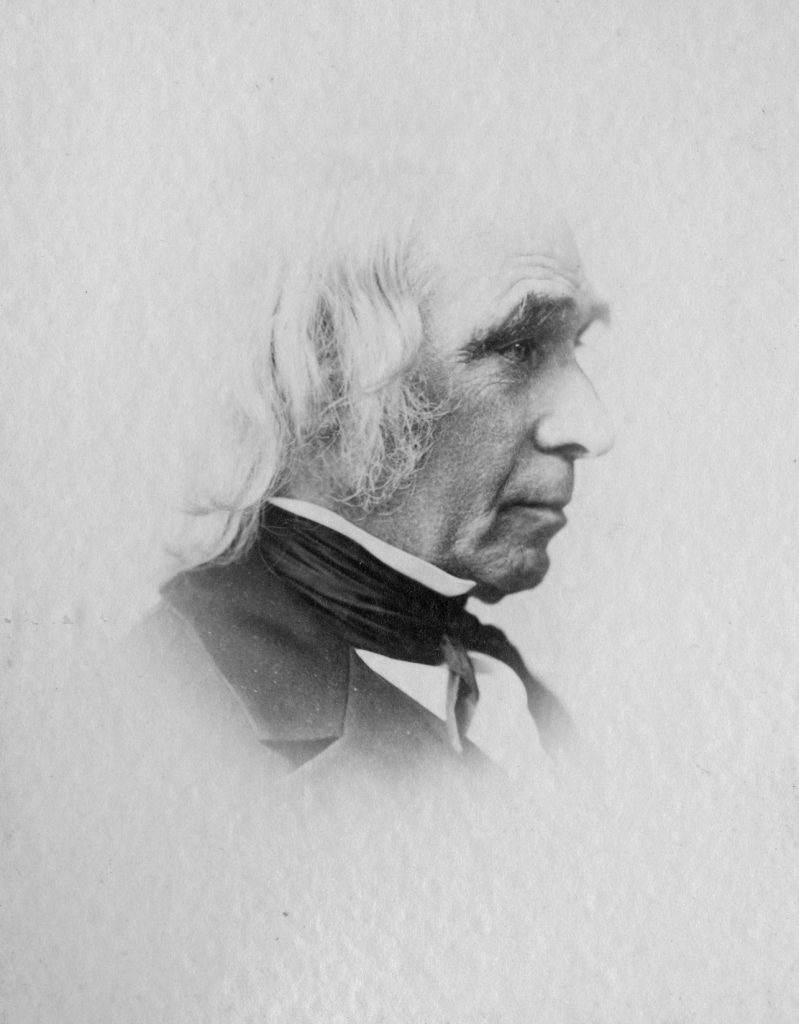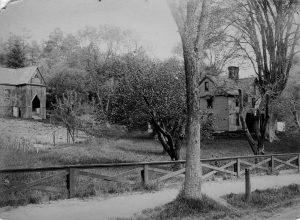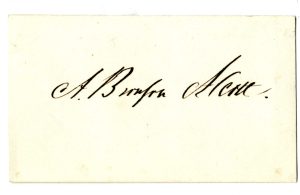
Born on November 29, 1799 on a farm near Wolcott, Connecticut, Amos Bronson Alcott came from humble beginnings. His father, Joseph Chatfield and his mother, Anna, had eight children, with Amos Bronson being the eldest. After Alcott’s formal education came to a halt at age fourteen, his dreams of attending Yale also ceased. Despite these setbacks, the ever curious and ambitious Alcott became a self-educated reader and writer. While Alcott always held a passion for education, he initially struggled to find work as a teacher. He worked odd jobs, ranging from the clockmaking business to being a traveling salesman. Alcott’s experience as a salesman provided access to the world around him. Witnessing the horrors of slavery inspired him to join the antislavery movement and to embrace other humanitarian causes.

Alcott moved to Boston after parting with a short-term but difficult teaching position in Connecticut. There, he met Abigail May, and the pair married in 1830. Together, they had four daughters: Anna, Louisa May (who went on to write Little Women), Elizabeth, and later Abby May. Throughout their married life, Abigail and Bronson moved from Connecticut, down to Pennsylvania, then back up to Massachusetts where he became involved in the Transcendental movement, alongside his friend Ralph Waldo Emerson. While being praised as one of the major influences in Transcendentalism, Alcott is also known for his unconventional teaching fundamentals, his experimental utopia Fruitlands, and founding the successful Concord School of Philosophy.
Lucy Brown, a boarder at the Thoreau home, introduced Alcott and Thoreau around 1839 or 1840, sparking a friendship that lasted the rest of their lives. The friendship between Thoreau and Alcott was multifaceted; both men followed their own paths, and held each other with respect and admiration. Referring to Alcott as “the philosopher,” Thoreau states, “One of the last philosophers—Connecticut gave him to the world—he peddled first her wares, afterwards, as he declares, his brains” (Walden). Alcott remembers Thoreau in Concord Days (1869), as “the most welcome of companions” for whom
Nature, poetry, life,—not politics, not strict science, not society as it is,—were his preferred themes. The world was holy, the things seen symbolizing the things unseen, and thus—worthy of worship, calling men out-of-doors and under the firmament for health and wholesomeness to be insinuated into their souls, not as idolators, but as idealists. His religion was of the most primitive type, inclusive of all natural creatures and things.
On January 17, 1843, Alcott was arrested by Sam Staples for non-payment of his 1842 poll tax; an abolitionist, Alcott believed the tax supported slavery. Thoreau followed his friend’s lead in this form of non-violent protest. In July of 1846, while living at Walden, Thoreau was also arrested for refusing to pay the poll tax, leading to the 1849 essay “Resistance to Civil Government,” now known as “Civil Disobedience.”
Later that same year Alcott was arrested, Alcott and his friend from England, Charles Lane, created Fruitlands. Fruitlands was a Harvard-based utopian community founded on Transcendentalist values. Lane and Alcott’s experiment lasted approximately half a year, from June until December 1843.
A few years before Alcott’s death, the philosopher showed a group of Walden Pond bathers the spot where Thoreau built his house and a cairn began, marking the spot with rocks and stones to memorialize the Concord surveyor. Because of the cairn, Roland Wells Robbins (1908-1987) was able to locate and excavate the hut’s foundation in 1945.
After suffering a stroke in 1882, Alcott’s health deteriorated until he passed away on March 4, 1888. Alcott and his family are buried in Concord, Massachusetts in the Sleepy Hollow Cemetery.
Texts by Amos Bronson Alcott

- Bronson Alcott’s Fruitlands Journal (1843-1844)
- The Forester (The Atlantic Monthly, April 1862)
- Miscellaneous Writings on Thoreau
- Orphic Sayings:
- Thoreau (from Concord Days (1872))
- Sonnets and Canzonets (1882)
About Amos Bronson Alcott:
- Higginson, Thomas Wentworth. “Amos Bronson Alcott” (from Contemporaries. Boston: Houghton Mifflin, 1899)


